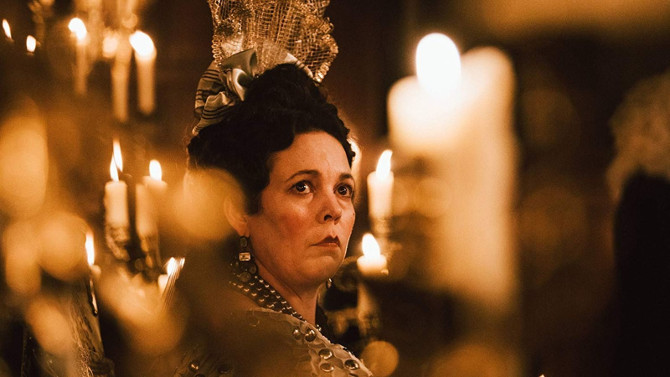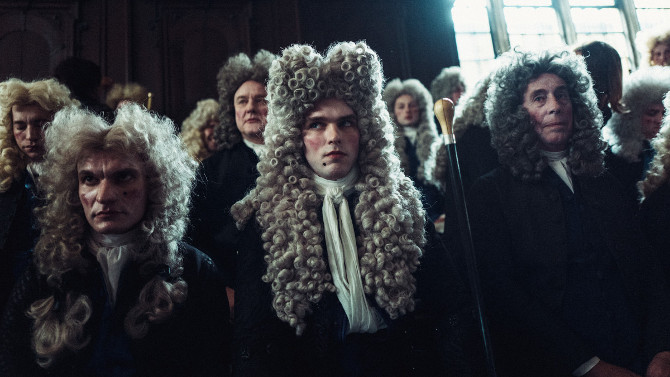An out-there European director, Yorgos Lanthimos has made waves with controversial pictures like Dogtooth, The Lobster, and The Killing of a Sacred Deer – intriguing, confounding, frustrating, and mesmerizing audiences worldwide. Now, he has made his first foray into a more mainstream style of film making with the 2018 period piece The Favourite (the first picture he and longtime co-scribe Efthymis Filippou did not write – in this case, an excellent story by Deborah Davis and Tony McNamara) – though, one thing is for sure, you cannot take the eccentric out of the Greek filmmaker.
Nominated for ten Academy Awards (including Best Picture, Best Achievement in Directing, and a slew of others), the first thing immediately noticeable is the feature’s striking visual style. Intricately measured and visually opulent (most of it is shot in Hatfield House, Hertfordshire, England), it is often symmetrically framed, a very formal seriousness to the playful story. Like the structured beauty of a perfectly danced waltz, everything is in its place, the camera moving with its characters always in their position, Lanthimos often utilizing a quick 180 degree pan pirouette to provide the viewer with a quick shot of the opposing perspective. Speed is also tinkered with, slow motion and a quicker frame rate adding to the film’s mesmerizing quality. Also worth noting, every once in a while there is a fascinating use of a sort of fish-eye lens-style shot – providing a distorted, arced look to this lavish, gilded world. Hand in hand with this is the exquisite cinematography, director of photography Robbie Ryan shooting almost the whole picture with available natural light (the sun, candles, fireplaces and torches providing an eerie, romantic, and realistic vibe, adding to Lanthimos’ trance-inducing visual style).
Set in early 18th century England (a time in which the country was at war with France – when were they not?), Queen Anne (Olivia Colman) is a fragile ruler uninterested in the day to day life of politics. Frail and sickly (gout is one such issue), Anne lacks any self control and structure, leaving the governing of the kingdom in the hands of her trusted friend and advisor, Sarah Churchill, the Duchess of Marlborough (Rachel Weisz) – a blunt, organized, and very cunning lady.
A new arrival comes in the form of a young woman, Abigail (Emma Stone), a former Lady, and cousin of Churchill’s who has fallen on hard times (mostly thanks to her loser of a father). Looking for any work, she is placed in the lowly position of scullery maid. With a mind for moving her way up, she makes several power manoeuvres, ingratiating herself with the Queen by way of a herbal mixture to soothe her gout.
Others flit around the periphery: the Leader of the Opposition, Robert Harley (Nicholas Hoult) – a man desperate to get an audience with the Queen yet is constantly thwarted by Sarah Churchill; John Churchill (Mark Gatiss) – the military mind married to Sarah; the Baron Samuel Masham (Joe Alwyn) – a man caught in the machinations of court and possible suitor of the ever rising Abigail; and the Earl Sidney Godolphin (James Smith) – a main political player within the party in power.
With both ladies vying for the ear of the Queen, a complex yet subtle power struggle ensues as Churchill slowly falls out of favour with Anne, her blunt, truthful ways in opposition to Abigail’s liberally free and lenient demeanor – negatively indulgent to the Queen’s every whim and desire. With relationships that are way more complicated than this, can anyone win in this sordid game of power and politics? Is this another case of power corrupts and absolute power corrupts absolutely?
Surprisingly comedic, though often awkwardly so (i.e. a naked man being joyously pegged by pomegranates; an indecent act in public; the competitive nature of gambling around duck races), it clashes beautifully with the formality and seriousness in which it is shot – Lanthimos constructing a hypnotic pacing in how he meshes the stunning visual camera work with the eccentricity of the narrative.
And then there are the performances. Intricate in their every action, the face tells so very much (sly expressions, be it disgust, frustration, pain, failure, the haunting of a past memory, or a disobedient twitch). Colman channels the flawed eccentricity of the Queen – irrational, gluttonous, lusty, sorrowful, moody, and melancholic (seventeen rabbits replace the same number of children she has lost) – sometimes meek, at other times, a defiant screamer. Weisz is almost manlike in her bluntness, living for the power, but also having the Queen’s best interest at heart (despite the fact that her view may be conflicting with the Queen’s own desires). Stone’s portrayal is the toughest to read. . . a woman whose past is so horrific, it is impossible not to feel sorry for her – though should we be; looking to improve her station in life, is it all ruthless manoeuvring, or does she also have an empathetic and caring side for the Queen and her cousin? Also worth noting, Stone impressively nails the British accent. Together, these three actors work wonders, their banter, scheming, and bonds (that make and break) truly enthralling (all three have earned Oscar nods for their superlative portrayals). The supporting cast must also be highlighted, especially Hoult, who captures the dandy, wig-wearing, posh, high-class 1700s nobleman to a tee.
With a rather abrupt ending that needs analysis (it is the most divisive part of the picture), it harkens back to Lanthimos’ bizarro style. Touching on power dynamics, grief, and the characters’ own personal hells, it flips the script from the sensual, playful one it once was to a very different emotional plane altogether (again, look at facial expressions to provide you with some hints as to what is going on mentally and physically).
A fascinating and unique period piece that is, in many ways, unlike any other, The Favourite is a must watch motion picture. With excellent performances and a fascinating style, Lanthimos also slyly recalls his two previous films – as the characters eat venison (in other words, deer) and lobster (they also race lobsters), a cheeky little touch. The Favourite, at least in one way this Awards’ race, may not be the duck to pick to win it all, but it sure is an interesting look down the rabbit’s hole.





Interesting, complex, visually delightful…a bird’s eye view into the complicated and conniving lives of the upper crust and those who surround them. The ending left me confused; I needed some insight and clarification here, otherwise, a very unique film. Certainly not your typical Hollywood fare.